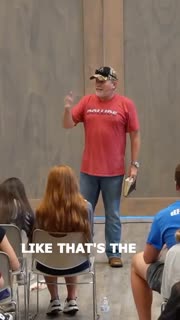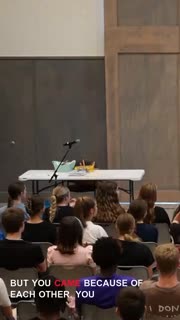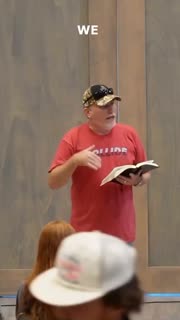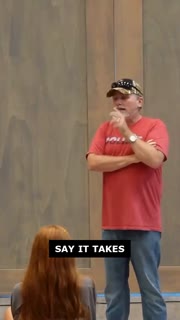Building Meaningful Friendships: Lessons from Jesus
Devotional
Sermon Summary
Bible Study Guide
Sermon Clips
1. "Like that's the kind of friend I hope you have. College roommate that you're, you're in their weddings and that 20 years after you're still like big moments show up for each other. I want you to have that. And I think if, if you guys were honest, like, I don't think I'd have to say by show of hands, who wants that? We all want that. Like we want close, close friendships. We want good relationships." [03:33] (21 seconds)
2. "But you came because of each other. You came to hang out because friendships matter. I get it. You get it. We know it. The world though is changing even our definition of friends, right? Like social media is changing that. Like, like I've got, I've got over a thousand friends on social media. They're not, they're not really friends though." [06:02] (21 seconds)
3. "What we call, like at City Church, we call them 2 a.m. friends. Meaning that if the world falls out, that the bottom of your world falls out, you get tragic news at two o'clock in the morning, you know immediately who you're calling. It's that 2 a.m. friend. They'll pick up the phone. And if they have a car, they're on their way to your house. That's the kind of friends you want." [07:07] (20 seconds)
4. "Here's what Jesus said. He said, this is my commandment. Love each other in the same way I've loved you. You love someone like I love you. That's the reciprocal nature. I'm going to give and you give back in equal portions. Like, you've probably had a friend that probably not, they're not a 2 a.m. friend, I wouldn't think. But you've got a friend that like only calls you when they need something. Right?" [09:55] (24 seconds)
5. "You need that reciprocal 2 a.m. friend. Here's what Jesus says next. Verse 13. This is, if you're a verse memorizer or you want to practice that discipline, this would be a good one. Verse 13. There's no greater love. And then to lay down one's life for one's friend. Like you won't find a better friendship than finding a friend that would literally, and Jesus is talking literally, literally die in your place." [12:27] (27 seconds)
6. "Here's what 2 a.m. friends look like. One, it's reciprocal, right? You give as much as you get, willing to lay your life down, which that's the highest of bars, but it's also transparent. What that means is you want the type of friend that, that you can share what you are really deeply feeling. Guys, and I say guys, I'm talking like gentlemen, men in the room. It's hard for us. Girls, y'all do so much better than us than that. Like, like y'all share your feelings." [18:47] (29 seconds)
7. "But you start small. It might be how you find friends. You start looking for people that, that maybe you're on the outside looking in. And that's a good start to a friendship. I came in this afternoon. I was at a conference in Dallas and it was a really interesting type conference. It wasn't one where you go sit and you listen to a speaker. The first night, Monday night, they had like this dinner meet and greet." [19:54] (22 seconds)
8. "It's hard to go first and be the first person to speak transparently. Because what if no one else does? It's hard to be the person that invites people together and go, hey, do y'all want to get together and do something this week? Hey, we can come over to my house. Hey, does anybody want to? It's hard to go first because if no one shows up, that hurts. It's hard to be the person who reaches out because you might get rejected and it hurts." [23:23] (28 seconds)
9. "I was a sophomore in high school. I had lived in Killeen, Texas all my life. When we, my mom remarried and my dad was an Apache helicopter pilot for the army. And so we went and lived in Germany for three years. And this was before cell phones, before internet, before like you had to write letters and it took months. And so I was really out of communication with friends. Three years later, we moved back to the same town, to the same house. But everything had changed in three years." [24:53] (27 seconds)
10. "They say it takes 300 hours before you'll step into the realm of possibly being a best friend of somebody. So it's not easy. But it's worth it. 2 a.m. friends you need, you're designed for them. You want them. It's hard. You know, I'm going to add something. I said start small and go first. I'm going to add a third thing. If you're a note taker, start praying. Start praying that God would bring you friends." [24:53] (31 seconds)
Ask a question about this sermon
2. "But you came because of each other. You came to hang out because friendships matter. I get it. You get it. We know it. The world though is changing even our definition of friends, right? Like social media is changing that. Like, like I've got, I've got over a thousand friends on social media. They're not, they're not really friends though." [06:02] (21 seconds)
3. "What we call, like at City Church, we call them 2 a.m. friends. Meaning that if the world falls out, that the bottom of your world falls out, you get tragic news at two o'clock in the morning, you know immediately who you're calling. It's that 2 a.m. friend. They'll pick up the phone. And if they have a car, they're on their way to your house. That's the kind of friends you want." [07:07] (20 seconds)
4. "Here's what Jesus said. He said, this is my commandment. Love each other in the same way I've loved you. You love someone like I love you. That's the reciprocal nature. I'm going to give and you give back in equal portions. Like, you've probably had a friend that probably not, they're not a 2 a.m. friend, I wouldn't think. But you've got a friend that like only calls you when they need something. Right?" [09:55] (24 seconds)
5. "You need that reciprocal 2 a.m. friend. Here's what Jesus says next. Verse 13. This is, if you're a verse memorizer or you want to practice that discipline, this would be a good one. Verse 13. There's no greater love. And then to lay down one's life for one's friend. Like you won't find a better friendship than finding a friend that would literally, and Jesus is talking literally, literally die in your place." [12:27] (27 seconds)
6. "Here's what 2 a.m. friends look like. One, it's reciprocal, right? You give as much as you get, willing to lay your life down, which that's the highest of bars, but it's also transparent. What that means is you want the type of friend that, that you can share what you are really deeply feeling. Guys, and I say guys, I'm talking like gentlemen, men in the room. It's hard for us. Girls, y'all do so much better than us than that. Like, like y'all share your feelings." [18:47] (29 seconds)
7. "But you start small. It might be how you find friends. You start looking for people that, that maybe you're on the outside looking in. And that's a good start to a friendship. I came in this afternoon. I was at a conference in Dallas and it was a really interesting type conference. It wasn't one where you go sit and you listen to a speaker. The first night, Monday night, they had like this dinner meet and greet." [19:54] (22 seconds)
8. "It's hard to go first and be the first person to speak transparently. Because what if no one else does? It's hard to be the person that invites people together and go, hey, do y'all want to get together and do something this week? Hey, we can come over to my house. Hey, does anybody want to? It's hard to go first because if no one shows up, that hurts. It's hard to be the person who reaches out because you might get rejected and it hurts." [23:23] (28 seconds)
9. "I was a sophomore in high school. I had lived in Killeen, Texas all my life. When we, my mom remarried and my dad was an Apache helicopter pilot for the army. And so we went and lived in Germany for three years. And this was before cell phones, before internet, before like you had to write letters and it took months. And so I was really out of communication with friends. Three years later, we moved back to the same town, to the same house. But everything had changed in three years." [24:53] (27 seconds)
10. "They say it takes 300 hours before you'll step into the realm of possibly being a best friend of somebody. So it's not easy. But it's worth it. 2 a.m. friends you need, you're designed for them. You want them. It's hard. You know, I'm going to add something. I said start small and go first. I'm going to add a third thing. If you're a note taker, start praying. Start praying that God would bring you friends." [24:53] (31 seconds)










